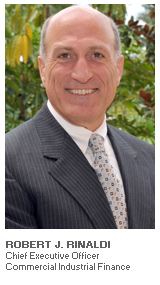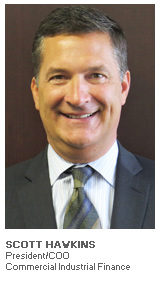
In September, King Commercial Finance – a St. Louis, MO-based company founded in 1982 by John King – announced the company’s name change to Commercial Industrial Finance. This recent rebranding strategy was implemented to more accurately reflect the company’s focus on the commercial and industrial (C&I) sector and to better align the company with the innovative approaches to the vendor finance market under the leadership of newly named CEO Bob Rinaldi – who joined the company in January 2014 – and Scott Hawkins, the company’s President.
Commercial Industrial Finance provides vendor equipment finance programs for companies of all sizes and specializes in creating finance programs for national and regional manufacturers, vendors and distributors of capital equipment to the commercial and industrial sector.
In the following Q&A with Rinaldi and Hawkins, we learn more about the company’s industrial equipment focus and approach to the highly-competitive vendor finance sector.
Equipment Finance Advisor: Gentlemen, please tell our readers the about the timing and strategy behind the rebranding of a company that has been in business over 30 years?
Scott Hawkins: The Company was originally founded by John King in 1982 and began as a regional lessor in the Midwest with a primary focus on the state of Missouri. Over the years the company expanded; for the first fifteen years we were a regional lessor and for the past fifteen years we have been a national player. When Bob joined us in January, our focus began expanding more rapidly on a national scale and we quickly recognized the name King Commercial Finance didn’t fully describe our industrial equipment focus. With this in mind, we developed a name that best describes our focus – which is the financing of industrial equipment.

Bob Rinaldi:The rebranding didn’t change our focus. Rather, the new brand better reflects the type of business we are doing. The branding is basically catching up with what we have been doing for years. Additionally, our name – Commercial Industrial Finance fits well with general banking terminology where most business owners, CEOs, CFOs and COOs are used to working with bankers from bank C&I lending departments. So the name seems to be a natural fit for what we do every day.
EFA: Please tell our readers about the expansion of the company from a personnel perspective and the types of transactions you are underwriting.
Rinaldi: We have already added a few sales professionals to our team and over time, as the flow of business grows from newly signed vendor finance programs, we will continue to add sales professionals to service these relationships.
We primarily finance light to heavy industrial equipment. Our transactions range greatly in size as some of our vendors require us to underwrite larger ticket deals versus smaller ticket transactions. Vendors tend to sell to a wide range of companies in order to meet the needs of the vertical market in which they play. So our deal sizes vary greatly. The vendors we are pursuing typically require multiple financing needs across the spectrum of transaction sizes and customer demographics – meaning working with A, B and C type credits, so we will underwrite everything from an investment grade to a highly leveraged company. Creating finance programs to meet the needs of our vendors is critical as ultimately our job is to help manufacturers, vendors and distributors sell more equipment.

Hawkins:We have also been doing municipal leasing for many years as King Commercial and we will continue to work in the municipal sector as Commercial Industrial Finance.
EFA: What are vendors, manufacturers and distributors seeking from their finance partners in today’s market?
Rinaldi: Obviously they are looking for flexibility and speed in getting transactions done. Our objective is to work more holistically and strategically with our vendors to understand the profiles of their customers and prospects. We want to understand their targeted prospects and existing customers and help them be more effective in closing business. Done effectively, we will help our vendor partners achieve greater sales force efficiency. This is where the rubber hits the road in vendor financing.
EFA: How would you describe the company’s approach to sales?
Hawkins: We engage in a consultative selling approach and this is reflected in our ability to bend and mold our financing relationships to deliver credit decisions that are favorable for everyone involved.
EFA: Please tell us about Commercial Industrial Finance’s energy focus and the markets you are pursuing within this sector.
Hawkins: We currently have a have a national manufacturer program for compressed air products. A number of years ago, compressors had become a lead target for energy savings with utility companies around the country. That was our entrance into the market. Here in the Midwest, energy rebates and incentives are still active for energy equipment such as LED lighting installations, which have a very fast return on investment. We are focusing on LED lighting, HVAC, building management systems, motor controls and compressed air within the energy sector.
EFA: Will you be pursing the solar market?
Hawkins: The incentives on solar equipment are not very attractive at this time in the Midwest. Many of the solar energy companies here in the Midwest have expanded to the west and east coasts in response to the slow Midwest market for solar installations. We will likely wait until the solar equipment manufacturing costs drop or the incentives return prior to entering the solar market.
EFA: How would you describe pricing pressure in the industrial equipment finance market?
Hawkins: We have chosen to do business in a highly competitive market. The companies we solicit tend to have choices for financing and in some cases other sources can provide more competitive rates. But again, we are all about developing and maintaining relationships, structuring deals and servicing accounts.
Rinaldi: I agree with Scott. The market is very competitive and it’s going to remain competitive. But at the end of the day our biggest competitor is going to be the same as always – cash. But again, we are taking a holistic approach to this market and we believe this is critical to our success.
EFA: Do you think companies that are in need of industrial equipment will start financing more equipment in 2015 and stop utilizing cash as a means to acquire equipment?
Hawkins: We have been in this economic cycle for a few years now, but our company has grown every year for the past thirteen years. So I am optimistic and believe capital equipment spending will increase in 2015.